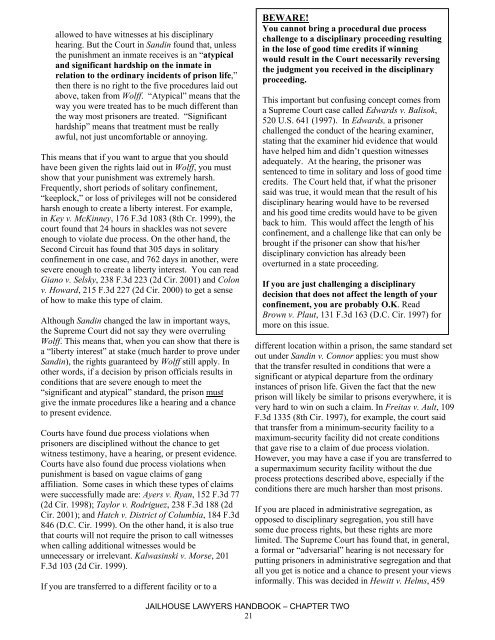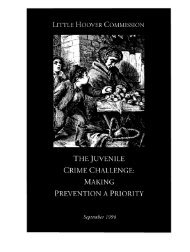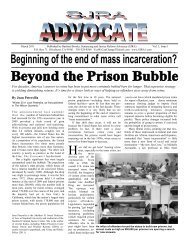Jailhouse Lawyer's Handbook - Sentencing and Justice Reform ...
Jailhouse Lawyer's Handbook - Sentencing and Justice Reform ...
Jailhouse Lawyer's Handbook - Sentencing and Justice Reform ...
Create successful ePaper yourself
Turn your PDF publications into a flip-book with our unique Google optimized e-Paper software.
allowed to have witnesses at his disciplinary<br />
hearing. But the Court in S<strong>and</strong>in found that, unless<br />
the punishment an inmate receives is an “atypical<br />
<strong>and</strong> significant hardship on the inmate in<br />
relation to the ordinary incidents of prison life,”<br />
then there is no right to the five procedures laid out<br />
above, taken from Wolff. “Atypical” means that the<br />
way you were treated has to be much different than<br />
the way most prisoners are treated. “Significant<br />
hardship” means that treatment must be really<br />
awful, not just uncomfortable or annoying.<br />
This means that if you want to argue that you should<br />
have been given the rights laid out in Wolff, you must<br />
show that your punishment was extremely harsh.<br />
Frequently, short periods of solitary confinement,<br />
“keeplock,” or loss of privileges will not be considered<br />
harsh enough to create a liberty interest. For example,<br />
in Key v. McKinney, 176 F.3d 1083 (8th Cr. 1999), the<br />
court found that 24 hours in shackles was not severe<br />
enough to violate due process. On the other h<strong>and</strong>, the<br />
Second Circuit has found that 305 days in solitary<br />
confinement in one case, <strong>and</strong> 762 days in another, were<br />
severe enough to create a liberty interest. You can read<br />
Giano v. Selsky, 238 F.3d 223 (2d Cir. 2001) <strong>and</strong> Colon<br />
v. Howard, 215 F.3d 227 (2d Cir. 2000) to get a sense<br />
of how to make this type of claim.<br />
Although S<strong>and</strong>in changed the law in important ways,<br />
the Supreme Court did not say they were overruling<br />
Wolff. This means that, when you can show that there is<br />
a “liberty interest” at stake (much harder to prove under<br />
S<strong>and</strong>in), the rights guaranteed by Wolff still apply. In<br />
other words, if a decision by prison officials results in<br />
conditions that are severe enough to meet the<br />
“significant <strong>and</strong> atypical” st<strong>and</strong>ard, the prison must<br />
give the inmate procedures like a hearing <strong>and</strong> a chance<br />
to present evidence.<br />
Courts have found due process violations when<br />
prisoners are disciplined without the chance to get<br />
witness testimony, have a hearing, or present evidence.<br />
Courts have also found due process violations when<br />
punishment is based on vague claims of gang<br />
affiliation. Some cases in which these types of claims<br />
were successfully made are: Ayers v. Ryan, 152 F.3d 77<br />
(2d Cir. 1998); Taylor v. Rodriguez, 238 F.3d 188 (2d<br />
Cir. 2001); <strong>and</strong> Hatch v. District of Columbia, 184 F.3d<br />
846 (D.C. Cir. 1999). On the other h<strong>and</strong>, it is also true<br />
that courts will not require the prison to call witnesses<br />
when calling additional witnesses would be<br />
unnecessary or irrelevant. Kalwasinski v. Morse, 201<br />
F.3d 103 (2d Cir. 1999).<br />
If you are transferred to a different facility or to a<br />
BEWARE!<br />
You cannot bring a procedural due process<br />
challenge to a disciplinary proceeding resulting<br />
in the lose of good time credits if winning<br />
would result in the Court necessarily reversing<br />
the judgment you received in the disciplinary<br />
proceeding.<br />
This important but confusing concept comes from<br />
a Supreme Court case called Edwards v. Balisok,<br />
520 U.S. 641 (1997). In Edwards, a prisoner<br />
challenged the conduct of the hearing examiner,<br />
stating that the examiner hid evidence that would<br />
have helped him <strong>and</strong> didn’t question witnesses<br />
adequately. At the hearing, the prisoner was<br />
sentenced to time in solitary <strong>and</strong> loss of good time<br />
credits. The Court held that, if what the prisoner<br />
said was true, it would mean that the result of his<br />
disciplinary hearing would have to be reversed<br />
<strong>and</strong> his good time credits would have to be given<br />
back to him. This would affect the length of his<br />
confinement, <strong>and</strong> a challenge like that can only be<br />
brought if the prisoner can show that his/her<br />
disciplinary conviction has already been<br />
overturned in a state proceeding.<br />
If you are just challenging a disciplinary<br />
decision that does not affect the length of your<br />
confinement, you are probably O.K. Read<br />
Brown v. Plaut, 131 F.3d 163 (D.C. Cir. 1997) for<br />
more on this issue.<br />
different location within a prison, the same st<strong>and</strong>ard set<br />
out under S<strong>and</strong>in v. Connor applies: you must show<br />
that the transfer resulted in conditions that were a<br />
significant or atypical departure from the ordinary<br />
instances of prison life. Given the fact that the new<br />
prison will likely be similar to prisons everywhere, it is<br />
very hard to win on such a claim. In Freitas v. Ault, 109<br />
F.3d 1335 (8th Cir. 1997), for example, the court said<br />
that transfer from a minimum-security facility to a<br />
maximum-security facility did not create conditions<br />
that gave rise to a claim of due process violation.<br />
However, you may have a case if you are transferred to<br />
a supermaximum security facility without the due<br />
process protections described above, especially if the<br />
conditions there are much harsher than most prisons.<br />
If you are placed in administrative segregation, as<br />
opposed to disciplinary segregation, you still have<br />
some due process rights, but these rights are more<br />
limited. The Supreme Court has found that, in general,<br />
a formal or “adversarial” hearing is not necessary for<br />
putting prisoners in administrative segregation <strong>and</strong> that<br />
all you get is notice <strong>and</strong> a chance to present your views<br />
informally. This was decided in Hewitt v. Helms, 459<br />
JAILHOUSE LAWYERS HANDBOOK – CHAPTER TWO<br />
21





